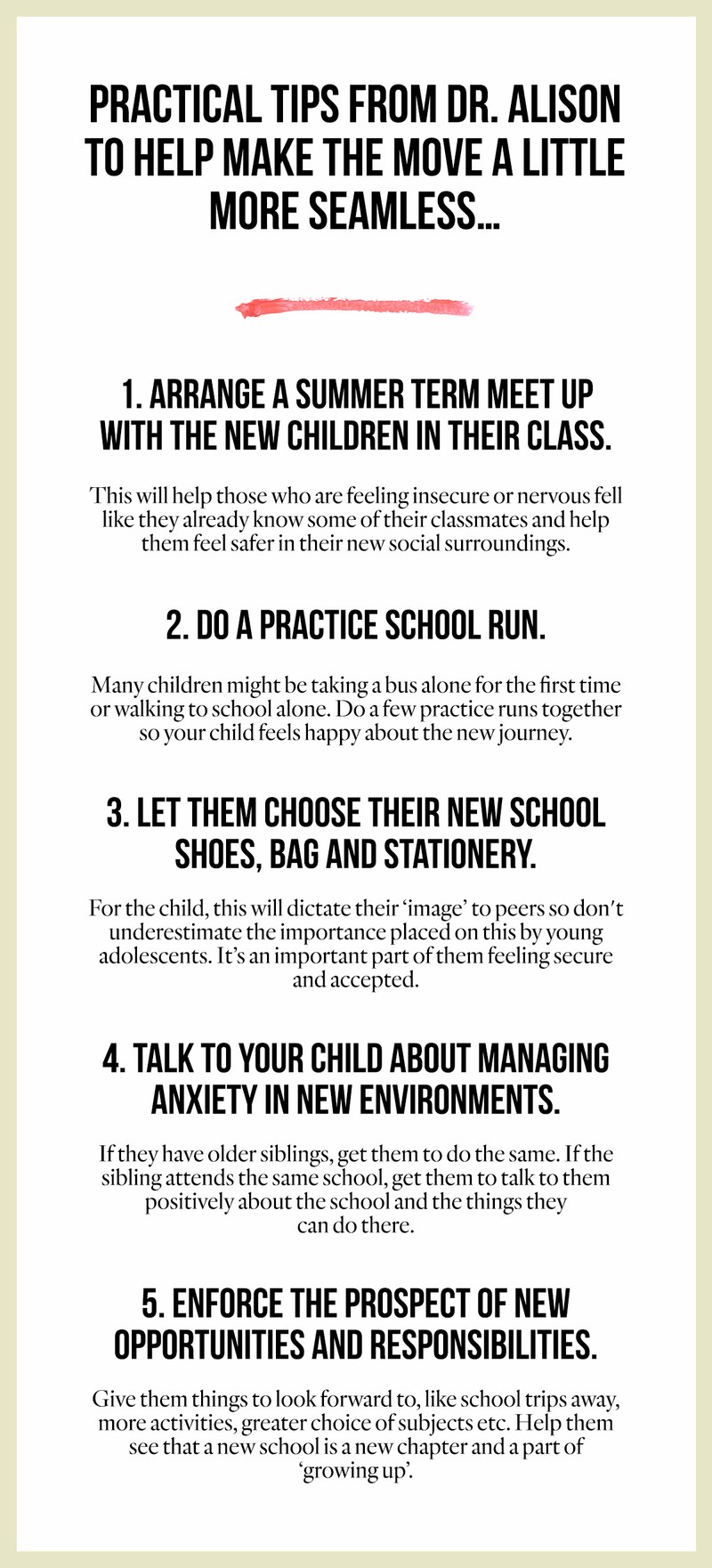Helping Your Child Make The Move To Secondary School
How might a child feel as their time at primary school comes to an end?
“They are likely to be feeling anxious, nervous and excited all at the same time. They might be sad about leaving their current primary school, especially if they were happy there and had a strong circle of friends. On the other hand, they might be relieved at the thought of leaving behind difficult and toxic friendships. No matter the circumstances, this signals a new start, so the impact is not to be underestimated.” – Yvonne Kekeliadis, creator of Brightstarz
What are some of the signs of anxiety or stress to look out for?
“Each child will show any worries in different ways and parents and families will know their child best. The key is to look for any major changes in their behaviour. For example, a child who was outgoing becoming more withdrawn or a child who used to enjoy spending time with friends shying away from social opportunities or becoming more isolated.” – Gemma Davies, head of lower school at St Dunstan's College
“There are many signs of anxiety – such as becoming irritable or wanting to cling onto existing friendships in an excessive way, for example, getting annoyed when their best friend hangs out with someone else. Physical complaints like breathing difficulties or a sore tummy are also common in children who are experiencing stress. Anxiety might also manifest in bad sleeping habits or not sleeping well, changes in appetite, biting nails, not wanting to be left alone in new environments or even panic attacks. Other signs to look for include becoming more argumentative, slamming doors, crying and mood swings. You have to factor in the idea that hormonal changes are also common around this time, so that can add an extra layer to these other symptoms.” – Yvonne
“It will vary enormously but you might have a child who is extremely extroverted using positive ‘masking’ to hide their anxiety. The most important thing to analyse is whether the behaviour is different to normal and if the emotion appears to boost the child’s confidence or lower it. Is it possible that this new behaviour is an attempt to ‘try on’ a new personality prior to going to school? It’s very common for young adolescents to experiment with different styles and ways of being, as they are still trying to ascertain who they are. Be as supportive as you can of any new image choices or style directions – this is simply a child trying to find their place.” – Dr Alison McClymont, child psychologist
Is it normal for a child to be emotionally irregular in the run up to starting a new school?
“Many children will be excited one day and a little more nervous the next. They may feel excited when they start to think about the aspects of their new school that they are most looking forward to, but more nervous if they start to think about the changes that worry them because this will most likely be the biggest transition they will have made in their educational journey to date. As this takes place alongside normal adolescent development, it can be challenging for children of this age to understand and manage their emotions.” – Gemma
What are likely to be their main concerns and worries?
“These will vary but common concerns would be that the school will be stricter or that they will be expected to work harder and perform better. This is also accompanied by the fear of managing a much more structured schedule. Another common worry is fear of older children – if the school goes all the way up to the sixth form, a 17-year-old looks like an adult to an 11-year-old, and this can feel really intimidating. That’s why some schools have a separate building for the sixth form. Children might also be entering a school without many or any of their primary school friends, and they may feel scared and apprehensive about how they will make new friends.” – Dr Alison
How can you help them if they are missing their old friends?
“Reassure them that just because they are moving on, it doesn’t mean that their old friendships will stop. Those friendships will change and evolve, but they do not have to end. Arrange a time for them to meet up, either at the weekend or during the school holidays. Also, reassure them that they will be able to make new friends in their new school and that this presents a wonderful opportunity to meet new people. If the school has shared any information, you could talk about the different ways it plans to help them make new friends.” – Gemma
Can you tell us more about quelling fears about older children?
“It’s always going to be nerve wracking being the new kid and going from being the oldest in the school to being the youngest. Remind them that everyone starts there, and they will be among peers who are going through exactly the same thing. Perhaps the new school has a buddy system that could give them someone to partner up with. This could even be someone from the year above, whom they can turn to for advice.” – Yvonne
Finally, can you offer any insight into parents forming relationships with new teachers?
“Most schools will have welcome events where they might discuss their rewards and sanctions procedures. Speaking to staff, asking questions or looking at the school’s policies and procedures can be very helpful, so that you can talk about the structures with your child. You want children to start the year off with a positive mindset, so I would spend time discussing the rewards and giving examples of the types of behaviours or actions that would be rewarded. Do reassure them that teachers will be more understanding at the start of school, as they know that children are settling in and learning lots of new systems and procedures.” – Gemma
DISCLAIMER: We endeavour to always credit the correct original source of every image we use. If you think a credit may be incorrect, please contact us at info@sheerluxe.com.


/https%3A%2F%2Fsheerluxe.com%2Fsites%2Fsheerluxe%2Ffiles%2Fwebsite-images%2F2025%2F04%2Fnew-parenting-background-image.jpg?itok=au3AjSlw)